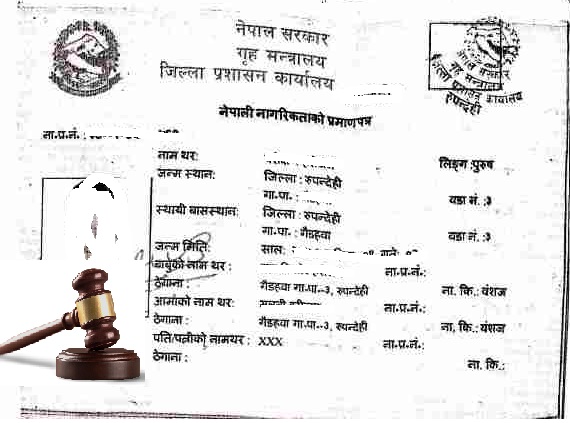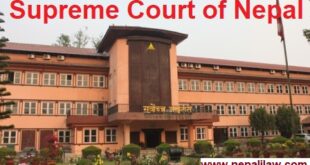The Supreme Court of Nepal developed new jurisprudence on the right to citizenship and the right to a nationality. In the common law system, higher courts playing important role in defining and interpreting the law as well as fulfill the legal gaps. The court verdicts are based on widely-accepted legal and judicial principles. The Supreme Court of Nepal has been playing a vital role in setting principles and norms for the protection of people’s rights.
Citizenship is becoming a regular problem in the context of Nepal. This article discussed the jurisprudence on nationality and citizenship developed by the Supreme Court. The court in the relation of legal and constitutional provisions upon citizenship, with referring the international human rights law.
One leading case of gender-based discrimination and discrimination obtaining the citizenship certificate. The Supreme Court made a significant judgment on 27 February 2011, Sabina Damai v. Government of Nepal et. al., Writ No. 067-WO-0703 of the year 2067 BS (2010 AD). It also published in the Nepal Kanoon Patrika 2068, volume 2 Decision number 8557.
Sabina Damai is a daughter of Gangamaya Damai, her birthplace Dolkha district of Nepal. Ganga Maya Damai left the birthplace when she was the age of 22 and came to Kathmandu (the capital city of Nepal) in search of work or a job. At this time she became pregnant and gave birth to a daughter, who is Sabina Damai, but her father is still unidentified. Ganga Maya doesn’t determine, who is the father of her daughter, because she had sexual intercourse with different persons at that movement.[i]
After completion of the age eighteen years[ii] Sabina Damai, applied for a citizenship certificate to the District Administration Office of Dolkha District, being the place where her mother is from, and Sabina Damai demanding the citizenship certificate by descent in her mother’s name. But the chief district officer denied issuing her the citizenship certificate, giving the reason that her father is unknown and should be father’s identified. Hence, he rejected her application through verbal notification.
In the writ petition of Sabina Damai, she requests the court to review the decision made by the Chief District Officer (CDO), of ground to dismiss her application for a citizenship certificate. As well as to issue an order to the Government of Nepal to provide the citizenship certificate with her mother’s name. She demanded that she was denied the citizenship certificate in spite of satisfying the entirety of the necessities set by the law.
The Supreme Court observed that citizenship certificates have a very essential document for every person. The citizenship certificate identifies a person’s nationality and his/her resident recognized being a citizen of a country. It is also essential to appreciate common, political just as monetary rights. One should qualify under the laws and constitution of Nepal as a resident, to get a citizenship testament.
Since Article 13 of the Interim Constitution of Nepal 2063 (2007) ensures the privilege to balance, which implies the entirety of the residents are equivalent under the steady gaze of the law paying little mind to their sex, sexual orientation, and other statuses Therefore ladies ought not to be the subject of separation by any means, in issues identifying with the citizenship endorsements also.
The court expressed, the law obviously gives that it is the privilege of the kid to get a citizenship declaration for the sake of mother who is as of now a resident of Nepal if there should arise an occurrence of unidentified father or missing one, according to article 8(2) of the Interim Constitution of Nepal, 2007. The court kept up that it is the central just as basic liberties of the children to get her ethnicity from mother.
In its decision, the court likewise brought up that Nepal is a State gathering to the Convention on Rights of Children (CRC), which gives that each youngster has right to identity and his/her wellbeing, ought to be ensured. Accordingly, the court closed, the Government of Nepal will undoubtedly regard its responsibilities towards kid rights and notice the deal commitments.
Based on these contemplations, the court decided that since accessible proof a lot build-up that Gangamaya Damai, mother of Sabina Damai (the offended party) is a Nepali resident by plummet, and Sabina Damai has additionally brought into the world in Nepal, Sabina is qualified for getting a Nepalese citizenship endorsement by plunge as per the predominant citizenship laws, just as the constitution of Nepal. The Supreme Court at that point requested the District Administration Office of Dolkha to give a citizenship testament to the candidate.
Result: The above mentioned of the Supreme Court has significant importance to the circumstance in Nepal for three reasons: I) in keeping up sex equity; ii) giving citizenship testaments to the huge number of qualified youngsters whose father are missing/obscure; and iii) noticing the arrangement commitments and decreasing statelessness. All the more significantly, in its decision, the Court demonstrated the requirement for the state to receive fundamental measures intending to the issue of citizenship authentication just as statelessness in Nepal.
In its decision, the Supreme Court has underscored the standard of uniformity under the watchful eye of the law just as the privilege to identity for all. Moreover, it reaffirmed the rule of non-separation which incorporates the option to rise to the security of the law for ladies and youngsters, paying little mind to their status in the public eye. Moreover, the Court added that it is the obligation of the State to abrogate all types of sick and barbaric convention and practices, customs, and so forth against ladies through the sanctioning of appropriate laws. The conventional and traditionalist outlook which considers ladies as sub-par compared to men should be changed. Being two of a kind, people are equivalent in nobility and rights.
Today, the stated purpose of the law doesn’t limit a lady from presenting citizenship certificates to her children [(Article 8 (3) of Nepal Citizenship Act 2006]. Nonetheless, it’s anything but an all-around acknowledged practice in Nepal – that of conceding citizenship for the sake of mother, by drop. By plunge is consistently deciphered to mean from the dad or male, mirroring the still generally male-centric attitude in the public arena. In reality, the models set in actualizing rules under the citizenship law, specifically the Citizenship Regulation and Directives, present a there is a specific deterrent to getting a citizenship certificate for the sake of the mother. These will currently should be revised according to the Supreme Court administering. It is an issue which should be tended to soon for an all the more, quiet and prosperous society. The choice of the Supreme Court has thusly been invited by common freedoms local area, social liberties activists whatnot.
 Nepali Law A complete legal information portal
Nepali Law A complete legal information portal

